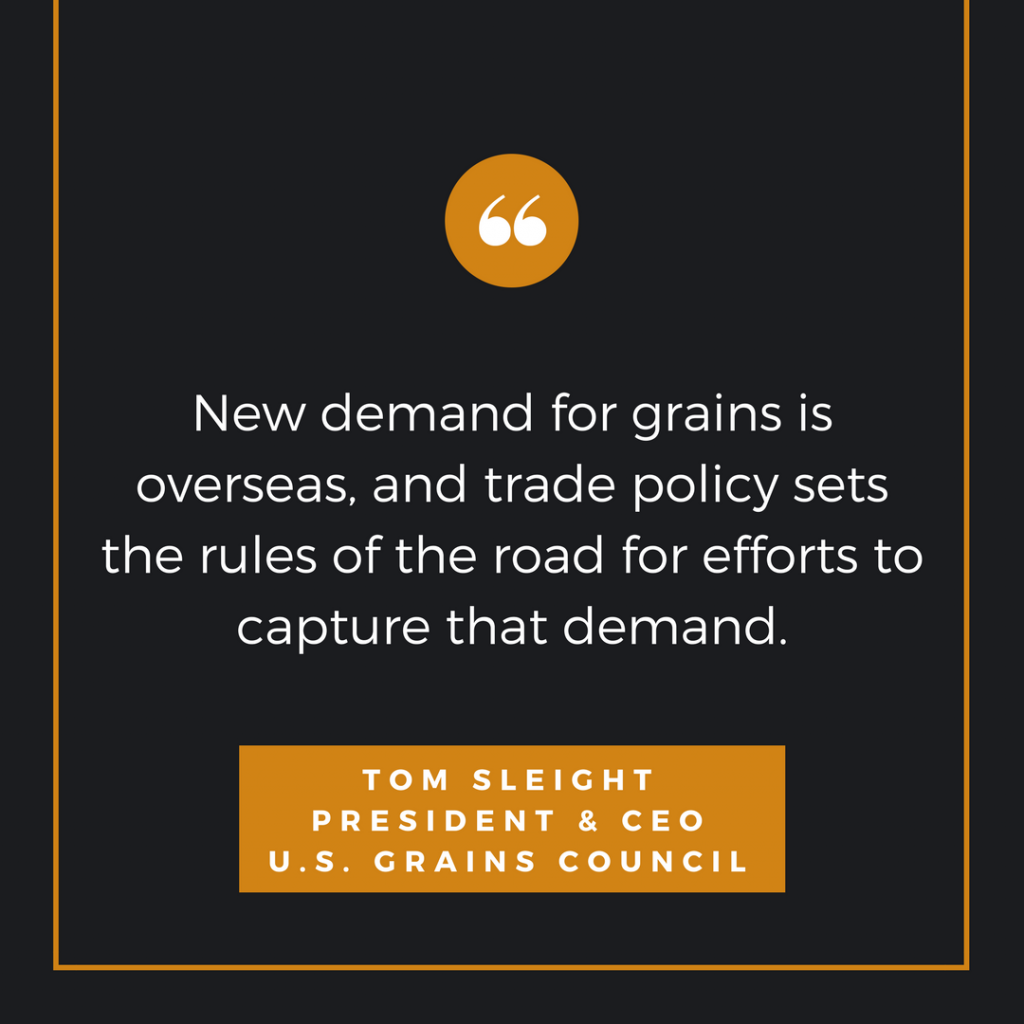The plethora of trade policy challenges facing the U.S. farm economy appeared to come to a head this week as the Trump Administration prepared to announce new tariffs on steel and aluminum imported into the United States, which are likely to trigger retaliatory measures from countries including the top buyers of U.S. feed grains and ethanol.
The grains economy has faced large stocks and low prices for some time, made more serious by market uncertainty including renegotiations of the North American Free Trade Agreement (NAFTA), a revisitation of the U.S.-Korea Free Trade Agreement, known as KORUS, new trade policy challenges with China and global trading partners moving forward with the Trans-Pacific Partnership (TPP) after the United States left the agreement in 2017.
“The U.S. grains and biofuels sectors are at a critical moment in our history,” said U.S. Grains Council (USGC) President and Chief Executive Officer Tom Sleight. “Trade policy complexity has been a part of our work for a half-century, but we are facing an unprecedent amount of uncertainty, even while overall demand is growing.”
Progress in the NAFTA modernization talks has been slow but steady, with significant movement on agriculture biotechnology and sanitary-phytosanitary agreements that help facilitate trade between the three partner countries. Still, challenges remain in the broader talks, and the threat of withdrawal by the United States if the talks do not conclude fast enough or at a standard acceptable to the Administration shadows their forward movement. Mexico and Canada, the parties to the agreement with the United States, are top buyers of every U.S. feed grain product or co-product, including ethanol.
The U.S. trading relationship with South Korea, the third largest overseas market for U.S. corn and U.S. distiller’s dried grains with solubles (DDGS) as well as a potentially important market for U.S. ethanol, could be challenged by both new talks to update the agreement, which largely exclude agriculture, and the possibility that the country would not be exempt from future steel or aluminum tariffs. Should South Korea face tariffs on its exports, they would likely be aimed against agriculture and other products.
U.S. grains and grains products also face several serious trade policy challenges with China. U.S. DDGS face tariffs stemming from anti-dumping and countervailing duties cases in recent years; U.S. ethanol is facing a 30 percent tariff, which is legal but trade-impeding; and U.S. sorghum has been accused of both dumping and inappropriate subsidization in cases China launched last month. In pursuing the latest investigations, against U.S. sorghum, Chinese authorities have used unprecedented and concerning procedural moves likely stemming from the broader political uncertainty between their country and the United States.
And Thursday, the 11 remaining members of the TPP agreement signed a revised version of that accord, known as the Comprehensive and Progressive Agreement for Trans-Pacific Partnership (CPTPP). This will give the group trade policy preferences and access to trading rules from which U.S. suppliers will not be able to benefit. While the direct tariff hit for U.S. grains and related products is not as severe as for some other sectors in agriculture, like wheat, the reputational damage has been noticeable, particularly in Southeast Asia, and not being part of the agreement means the United States is not part of the platform for the most modern trade rules, including on issues like biotechnology and sanitary and phytosanitary issues.
At press time Thursday, the Administration seemed poised to announce new tariffs of 25 percent on imported steel and 10 percent on imported aluminum, though no formal announcement had been made. There is also no word yet on which countries, companies or commodities could be excluded from the tariffs, though it is assumed they will hit allies and trading partners. The market can expect retaliation in kind, including from trading partners like Mexico, Canada, South Korea, Brazil and the European Union.
“We have tremendous concern about the global ramifications of any new tariffs on ag exports,” Sleight said. “Agriculture markets are global, and our members – both farmers and exporters – will feel the impacts immediately when new tariffs from our trading partners impact demand. Our products can compete on price and quality anywhere in the world, but the domino effects of new tariffs could make that much, much harder.”
While tariffs and any resultant retaliation could implicate most of the major markets for U.S. grains, many markets will continue normal operations, and the Council will continue pressing the value of U.S. corn, sorghum, barley, DDGS and ethanol in the more than 50 countries that host its programs. Particularly in the Middle East, South America and Southeast Asia, demand continues to grow, and the Council continues to serve global buyers interested in U.S. products.
“This is the time for farmers to pay attention and know that your voice is important in this debate and the growth of our global markets,” Sleight said. “The trade issues our industry is facing are complicated but they impact the bottom line directly. New demand for grains is overseas, and trade policy sets the rules of the road for efforts to capture that demand.”
About The U.S. Grains Council
The U.S. Grains Council develops export markets for U.S. barley, corn, sorghum and related products including distiller’s dried grains with solubles (DDGS) and ethanol. With full-time presence in 28 locations, the Council operates programs in more than 50 countries and the European Union. The Council believes exports are vital to global economic development and to U.S. agriculture’s profitability. Detailed information about the Council and its programs is online at www.grains.org.

